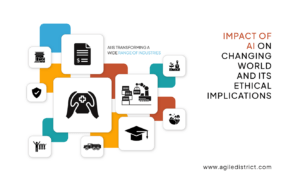AI stands for Artificial Intelligence, which refers to the development of computer systems that can perform tasks that would normally require human intelligence, such as visual perception, speech recognition, decision-making, and language translation.
There are two main branches of AI: narrow AI and general AI. Narrow AI is designed to perform specific tasks and is currently the most common type of AI in use. General AI, on the other hand, refers to systems that have the ability to perform any intellectual task that a human can.
AI systems are trained using large amounts of data and algorithms to identify patterns and make predictions. They can be supervised, unsupervised, or reinforced, depending on the type of learning they perform.

AI is transforming a wide range of industries and is expected to have a profound impact on the world in the coming years. It has the potential to revolutionize fields such as healthcare, finance, transportation, and manufacturing, and has the potential to improve our lives in countless ways. Some of these are highlighted below:
- Healthcare: AI is being used in medical imaging to improve diagnoses, in drug discovery to speed up the development of new treatments, and in patient monitoring to provide personalized and continuous care.
- Finance: AI is being used in financial services to analyze large amounts of data, detect fraud, and improve the efficiency of operations.
- Transportation: AI is being used in autonomous vehicles, such as self-driving cars, to improve safety and efficiency on the roads.
- Manufacturing: AI is being used in manufacturing to optimize production processes, reduce waste, and improve quality control.
- Retail: AI is being used in retail to personalize customer experiences, improve product recommendations, and streamline supply chain operations.
- Education: AI is being used in education to personalize learning, provide real-time feedback, and facilitate online collaboration.
- Agriculture: AI is being used in agriculture to optimize crop yields, reduce waste, and improve sustainability.
- Security: AI is being used in security to detect and prevent cyber attacks, improve surveillance, and enhance national security.
- Environment: AI is being used in environmental monitoring to detect and predict natural disasters, monitor air and water quality, and mitigate climate change.
- Social Services: AI is being used in social services to improve the delivery of services, such as healthcare and education, to underserved populations.
These are just a few examples of how AI is changing the world. It is clear that AI has the potential to revolutionize many industries and improve many aspects of our lives. However, it is also important to carefully consider the ethical implications of AI and ensure that it is developed and used in a responsible manner.
Implications of AI
Bias and Discrimination: AI algorithms can perpetuate and amplify existing biases in society if they are trained on biased data. This can lead to unfair and discriminatory outcomes.
- Privacy Concerns: AI often requires large amounts of personal data to function effectively, raising serious privacy concerns.
- Job Loss: AI has the potential to automate many jobs, potentially leading to significant job loss and economic disruption.
- Responsibility: As AI systems become more advanced and autonomous, it can be difficult to determine who is responsible for their actions and decisions.
- Transparency: AI systems can be opaque, making it difficult for users to understand how they make decisions and for regulators to hold them accountable.
- Control: There are concerns about who has control over AI systems and the extent to which they can be used for malicious purposes.
- Autonomy: As AI systems become more autonomous, there are concerns about the potential for them to make decisions that are not aligned with human values and ethics.
These are just a few of the ethical implications of AI, and it is important for policymakers, developers, and society as a whole to consider and address these concerns as AI continues to advance and become more prevalent in our lives.